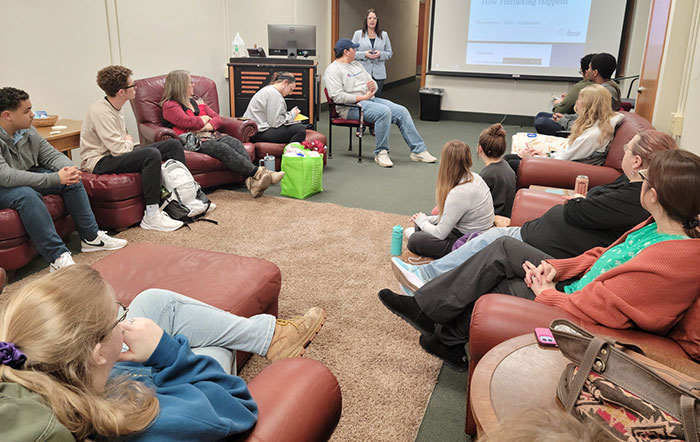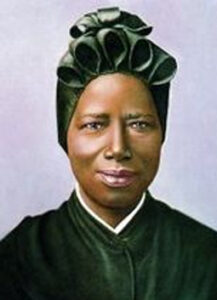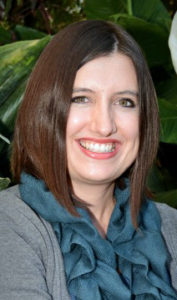
Sara K., a survivor advocate for Braking Traffik, talks with students at St. Ambrose University in Davenport Feb. 8.
By Anne Marie Amacher
The Catholic Messenger
“Human trafficking is alive and well in Iowa,” said Robin Sade of St. Alban Episcopal Church in Davenport. She and Ann Mohr of St. Ann Parish in Long Grove are members of Attacking Trafficking, a group that creates awareness and offers education on human trafficking.

Attacking Trafficking and Braking Traffik, a program of Family Resources, hosted a presentation Feb. 8 at St. Ambrose University in Davenport for its students. Feb. 8 is the feast day of St. Josephine Bakhita, patron saint of Sudan and for human trafficking victims and survivors.
Students shared their reasons for attending the event. One wants to work with victims in the future. Another learned about trafficking in his hometown and wants to raise awareness. Another saw signs of possible trafficking in her job as an EMT and is now studying social work. Several knew of a victim of trafficking.
Sara K., a survivor advocate for Braking Traffik, said human trafficking victims are young, old, male, female, citizens and non-citizens. “Human trafficking is selling another human through force, fraudulence or coercion” and not always linked to sex. Other forms are sex trafficking (recruitment, harboring, transportation, obtaining, patronizing or soliciting of a person for the purpose of a commercial sex act) and labor trafficking (recruitment, harboring, transportation, obtaining, patronizing or soliciting for labor or service.) Both forms use the same tactics.
Traffickers target, recruit and exploit people. “They groom them. They build trust, turn around and harm them and repeat this cycle,” Sara K. said. Traffickers many times find their victims through the internet and social media. Youths especially might seek attention, have problems at home, are neglected or abused or post about other issues. “Traffickers want to be the ‘hero.’ They will manipulate, threaten, control and use fear tactics,” she said. “It’s not always physical, but they use mind control.” It happens over time.
Sara K. advised the SAU students not to overshare information about themselves or others. “Don’t post in real time if you are somewhere.” Signs of possible trafficking include marks on the body, avoiding eye contact, sleeping in class, running away, isolation and fear to speak for oneself.
If you suspect human trafficking, “Don’t judge that person. Don’t try to rescue that person. Err on the side of caution.” If possible, ask that person if it is OK to offer a listening ear, Sara K. said. Sade added, “Do not confront the trafficker. Call 911.” The toll free national hotline is (888) 373-7888.
Braking Traffik and others advocate for state law to exclude minors from being charged with prostitution. “They are under 18. They cannot consent,” Sara K. said. Thirty-four states have passed such legislation, she said. A proposed bill’s wording stopped it from moving forward in Iowa last year, Mohr said. “You as voters and citizens have the power to call your legislator to pass this.” The legislation “is stalled, not dead.”
An Iowa law that took effect last year requires lodging providers to have all employees successfully complete certified human traffic prevention training for the facilities to receive public funds for payment of services provided to state employees/groups using the facilities. “Up to 80% of trafficking happens in hotels,” Mohr said.
During a Q&A, student Chase Mason asked if informational literature could be placed around campus. Tammy Norcross-Rietzler, campus ministry director, supported the idea of placing stickers in restroom stalls with an informational phone number for potential victims to call. The campus ministry team and students plan to meet with school officials regarding distribution of informational materials.
Nicky Gant, the university’s service and justice coordinator, said the prevalence of human trafficking in Iowa and the way it has affected the lives of people, even loved ones, disturbs her. “But I am

encouraged by the possibility of making positive change by raising awareness like we did tonight.”
After the event, Brock Lakin of Omaha said the talk was very informative. He first learned about human trafficking while in high school. Omaha is home to the college baseball World Series and thousands of people visit then. His employer at the time talked to the employees about trafficking. “It shocked me to learn this,” he said. “I didn’t know what signs to look for, but now I do. I want to be an advocate for those who are being trafficked.”











